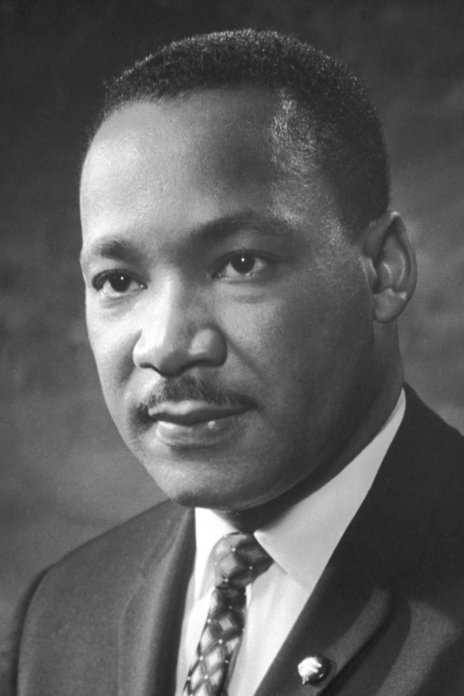Martin Luther King frasi celebri

Martin Luther King Frasi e Citazioni
da La forza di amare
La forza di amare
da La forza di amare
La forza di amare
Il sogno della non violenza
Citazioni di Martin Luther King
p. 234 sg.
Citazioni di Martin Luther King
Origine: Dal discorso al Lincoln Memorial di Washington, 28 agosto 1963; citato in Ferdie Addis, I have a dream. I discorsi che hanno cambiato la storia, traduzione di Valeria Bastia, De Agostini, Novara, 2012, p. 104 http://books.google.it/books?id=obMxU4M4kQ4C&pg=PT104. ISBN 978-88-418-7870-5
“La chiesa […] non è la padrona o la serva dello stato, ma la coscienza dello stato.”
da La forza d'amare
La forza di amare
“La salvezza dell'uomo è nelle mani dei disadattati creativi.”
da La forza d'amare
La forza di amare
“Ignorare il male equivale ad esserne complici.”
da Il sogno della non violenza. Pensieri
Il sogno della non violenza
Citazioni di Martin Luther King
Citazioni di Martin Luther King
Citazioni di Martin Luther King
Origine: Citato in Teresio Bosco, Uomini come noi, Società Editrice Internazionale, Torino, 1968.
“Questo 4 di luglio è vostro, non mio.”
da Il sogno della non violenza. Pensieri
Il sogno della non violenza
Origine: Lettera a un amico antisionista è una lettera aperta erroneamente attribuita a Martin Luther King. Cfr. Letter to an Anti-Zionist Friend.
Origine: Citazioni erroneamente attribuite, p. 234
Origine: Citazioni erroneamente attribuite, p. 234
Citazioni di Martin Luther King
Origine: Da The Words of Martin Luther King Jr., New Market Press, New York, 1983, p. 71; citato in Dennis Dalton, Gandhi, il Mahatma: il potere della nonviolenza, traduzione di Andrea Boni, ECIG, Genova, 1998, p. 13. ISBN 88-7545-842-1
Citazioni di Martin Luther King
Citazioni di Martin Luther King
Citazioni di Martin Luther King
Origine: Citato in AA.VV. 2018, p. 320.
“Cristo ci ha dato gli obiettivi, Mahatma Gandhi la tattica.”
Citazioni di Martin Luther King
Origine: Citato in AA.VV. 2018, p. 225.
Martin Luther King: Frasi in inglese
“One of the sure signs of maturity is the ability to rise to the point of self criticism.”
1960s, The Rising Tide of Racial Consciousnes (1960)
The thing that bothers me about it is that they didn't give me full information, because at least I would have wanted to attend God's funeral. And today I want to ask, who was the coroner that pronounced Him dead? I want to raise a question, how long had He been sick? I want to know whether He had a heart attack or died of chronic cancer. These questions haven't been answered for me, and I'm going on believing and knowing that God is alive. You see, as long as love is around, God is alive. As long as justice is around, God is alive. There are certain conceptions of God that needed to die, but not God. You see, God is the supreme noun of life; He's not an adjective. He is the supreme subject of life; He's not a verb. He's the supreme independent clause; He's not a dependent clause. Everything else is dependent on Him, but He is dependent on nothing.
1960s, Why Jesus Called A Man A Fool (1967)
1960s, Keep Moving From This Mountain (1965)
1960s, The Quest for Peace and Justice (1964)
1960s, The Quest for Peace and Justice (1964)
1960s, Letter from a Birmingham Jail (1963)
All tyrants, past, present and future, are powerless to bury the truths in these declarations, no matter how extensive their legions, how vast their power and how malignant their evil.
1960s, Emancipation Proclamation Centennial Address (1962)
“Nonviolent resistance is not aimed against oppressors, but against oppression.”
1950s, Three Ways of Meeting Oppression (1958)
1950s, Three Ways of Meeting Oppression (1958)
1950s, Loving Your Enemies (Christmas 1957)
[“Loving Your Enemies,” Sermon Delivered at Dexter Avenue Baptist Church, King, Jr., Martin Luther, 1957-11-17, https://kinginstitute.stanford.edu/king-papers/documents/loving-your-enemies-sermon-delivered-dexter-avenue-baptist-church, http://www.webcitation.org/6x5ROMlxu, 2018-02-08]
1950s, Loving Your Enemies (November 1957)
1950s, Conquering Self-centeredness (1957)
1950s, Conquering Self-centeredness (1957)
1950s, Give Us the Ballot (1957)
1950s, "The Birth of a New Nation" (1957)
Origine: Stride Toward Freedom (1958); also quoted in The Life of Martin Luther King, Jr. (1982), by Stephen B. Oates, pp. 81-82 note: 1950s
Address at Cornell College, Mount Vernon, Iowa (15 October 1962) https://news.cornellcollege.edu/dr-martin-luther-kings-visit-to-cornell-college/; also quoted in Wall Street Journal (13 November 1962), Notable & Quotable , p. 18
Variant:
It is true that behavior cannot be legislated, and legislation cannot make you love me, but legislation can restrain you from lynching me, and I think that is kind of important.
Address at Finney Chapel, Oberlin College (22 October 1964), as reported in "When MLK came to Oberlin" by Cindy Leise, The Chronicle-Telegram (21 January 2008)
1960s
1950s, Give Us the Ballot (1957)
1960s, Keep Moving from this Mountain (1960)
1960s, Address to Cornell College (1962)
1960s, Address to Cornell College (1962)
1960s, Address to Cornell College (1962)
1960s, Address to Cornell College (1962)
